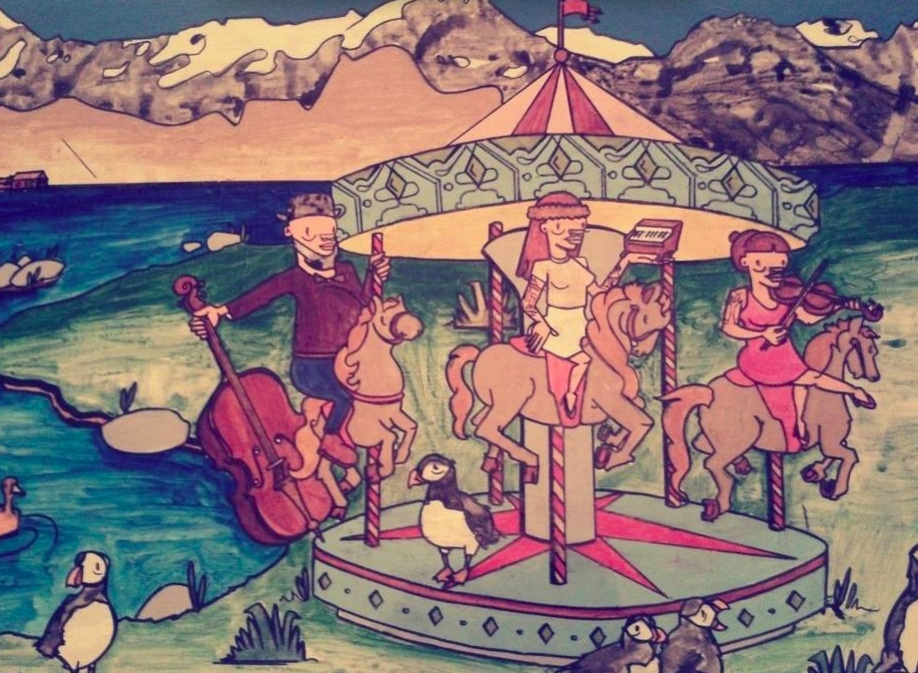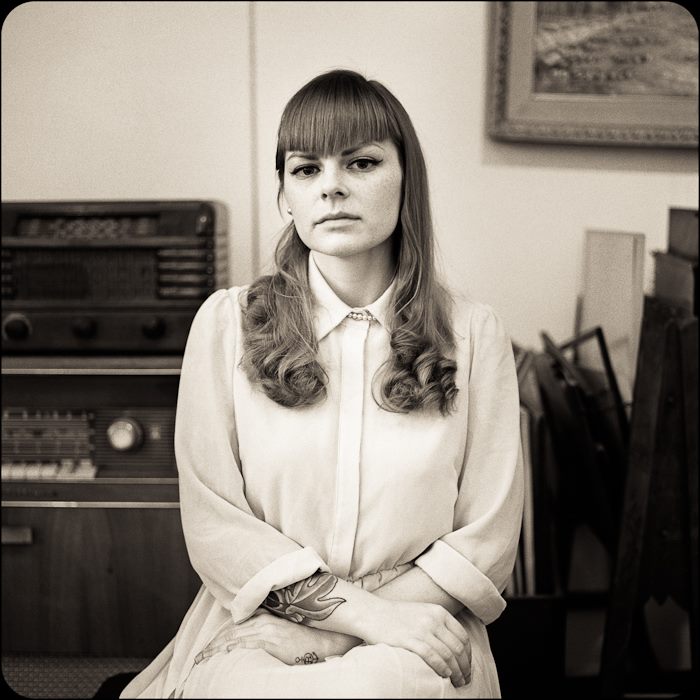Flying Hórses’ June 27 Fundraiser Review & Future Plans Interview

As a prelude to the long weekend that has now blurred into the first days of Bluesfest, Centretown’s cherished Raw Sugar Café hosted on June 27th a medley of Ottawa’s experimental folk and art-rock bands. Bosveld, Tindervox, Pony Girl, and Flying Hórses united in an intimate concert with the intention of fundraising for equipment to replace what was stolen in a break-in to the home of Flying Hórses’ musician, Jáde Bergeron. The space created around each featured musician’s artistry enabled the potential for unity and healing, while also successfully raising enough funds to purchase a laptop for Bergeron’s continued recording.
An entirely acoustic set from Théan Slabbert, of electro-acoustic folk act Bosveld, came as a delicate introduction to the night. Appropriately reflecting the topographic symbolism of the band name’s Afrikaans origin, Slabbert enchanted the audience with the panoramic character of his soft vocals and arrangements. Removed from his usual accompanying sheen of synth, Slabbert’s voice echoed instead of warm wood, its hushed tones fading into the grain of the guitar. Lyrics and melodic shapes reflected geographies familiar to listeners – those of swelling riverbeds as much as the changing crests of emotions.
Bathed in stillness after Théan Slabbert’s performance, the atmosphere of the tightly packed café was transformed by neoromantic rock band Tindervox. Performing tracks from their self-titled EP, released this past January, the group hypnotized the audience with theatrical melodies and the magnetic vocals of singer Kara Askwith. “Hanging onto faces in the crowd,” sang Askwith, revealing unembellished wisdom throughout Tindervox’s poetry, “Holy love is hard to find when you’re searching with your mind.” Kara’s soulful vocals — and elemental references of pine, fire, and ash — were punctuated by guitarist Justin Black’s classic rock character.
Transitioning the audience from the steady rhythms of Tindervox into a more abstracted fantasy, art-rock band Pony Girl played an uncharacteristically small, acoustic set with only four of its usual eight members. Jazz-tinged harmonies filled the café. A coalescence of symbolic lyrics and liquid polyrhythmic arrangements dissolved the audience. Each myth weaved between Pascal Huot’s serene voice and the fay vocals and oboe of Yolande Laroche, to the coiling phrases of Julien Dussault’s guitar and Isaac Vallentin’s expressive supporting vocals.
“There are dreams where no one dies,” hover the opening lyrics of Pony Girl’s 2013 album Show Me Your Fears, “Confined in bodies, what shape is mine?”
The presence and absence of light were inescapable in Pony Girl’s allusions to the dawn, the morning star, sunlight, and golden hues. Even the passage of each song’s rhythms into the next seemed to incline in the patterns of the morning to dusk. Intricate, metaphysical and modest, Pony Girl’s set weighed with the gravity necessary to approach the night’s closing performance by Flying Hórses.
In a signature ritual, keyboardist Jáde Bergeron opened her set with cellist Raphael Weinroth-Browne by invoking the chant of miniature music boxes. Fragile figurines of horses spinning in carousels alluded to themes of childhood innocence in which Bergeron firmly grounds her music. One cascade of notes falling eerily into the next twisted the ambiance into a fairy-tale trance. Bergeron and Weinroth-Browne developed the preceding narrative of light into a disturbed measuring of time. Sombre cello variations were performed by Weinroth-Browne with a poet’s thunderous energy, accenting Bergeron’s persisting celestial melodies. At times, one instrument threatened to overtake the other, only to subside again into complete harmony. In silence, the audience was spellbound by the instrumental surge of Flying Hórses.
It was easy to lose direction in the mazes constructed by the talented duo. Even more so, with the evening’s entire roster successfully captivating the assembled crowd at Raw Sugar, it might have been easy to also forget the tragic context of the show. Yet, the urgency of bringing the community together to support a musician in hardship was gently reaffirmed in the brief moments when Bergeron gracefully pushed through tears.

Q & A with Jáde Bergeron of Flying Hórses
As Flying Hórses, you perform mostly with Raphael Weinroth-Browne. What drew you to collaborate with him? And what parallels do you see between his dramatic style and your ideas?
Raphael and I have known each other for five years now and before we started playing together, we would always have endless conversations about the depth of music. How music isn’t something you do or play, music is its own spirit and sometimes you luck out and it pays you a visit. I think we’ve always had an understanding for the type of music we play together now. Raphael and I are pretty meticulous and are on the same page about making each note count. We both feel the importance of performing from deeper levels, especially that our sounds are delicate and instrumental. It continues to amaze me just how talented and hard-working he is. He is an integral part of this project.
You’re going to Iceland. Why there? Does the Arctic landscape influence your vision in any ways, for your upcoming project?
Iceland, to me, is a feeling. Not to worry, I’m well aware it’s also a beautiful Island with magnificent landscapes, geothermal energy, and some of the best fish in the world. This feeling that I’m talking about is something we all have, for one place or another. It could be a country far away, a childhood home, or a patch of tall grass in your dreams. A place where you can breathe and connect with the peace in your heart. Sometimes there are no words to express what something truly means to you, and that’s why I’ve created this music. This project is purely based on childhood memories of safe spaces and feelings such as Iceland.
As much as you can share, what are some of the themes that are going into your new project? What can we expect that might be new or evolved from your existing work?
Flying Hórses came to me in a dream a few years ago after falling asleep to cranked music boxes by my bed. Music boxes play an important role in the project as they reflect nostalgic memories of innocence and simplicity. Alone, a single music box may sound soothing and peaceful but throw in five or six other boxes and the notes become dissonant and complicated which can also evoke memories of confusion and uncertainty. A greater part of being a child and not understanding why things are the way they are. Is memory a theme, I’m not even really certain.
You will be recording at Sundlaugin Studio in Reykjavik. You did mention that you can’t speak much about it, but how do you think recording in this studio will affect this new project?
We are beyond blessed to have the opportunity to work with Biggi from Sundlaugin. Although my time in Iceland will be brief, I plan on bringing back with me sounds from one of the most magical places on earth. I’m hoping to be able to get my hands and heart on some pretty rare instruments for the recordings. There is indeed, a lot of work to be done. Listeners can expect layers in addition to the music we have been performing live for a little over a year now. A few little surprises in-between songs even.
As you prepare to leave, are there any influences specific to Ottawa that you will be bringing with you to Iceland? In what ways do you think the artistic scene in our city has coloured your work?
Ottawa’s artistic community is like no other I’ve ever been a part of. Support is what grounds us, and the production value in the city amazes me. There’s always something really fun going on, sometimes it’s hard to decide how to spend your time. Regardless of what’s happening, you can be sure to bump into someone you know and before you know it, you’re collaborating on a new project. We do all of our best to connect with one another and respect each other’s work and passion. Some of my favourite bands are here in Ottawa, and knowing they’re off doing what they love, really inspires me to follow my dreams.
In retrospect, what do you think the concert reflected of Ottawa, both in terms of musical appreciation and the community? What were your impressions?
Unfortunately I experienced a hardship recently. I had a break and enter in my home and goods were taken. When you’re a musician and life gets tough, you play music, so that’s what the show was about. Pony Girl, Bosveld and Tindervox are bands that I have a lot of respect for. Their sounds are unique and I knew that sharing the stage with them would help me heal, and it did. We are so humbled by the turnout and beyond grateful for the donations that were given to us. I was able to purchase a new computer so that the recording of this project and other projects can run their course naturally. As mentioned previously, the Ottawa community is incredible and it is without a doubt, home sweet home.
